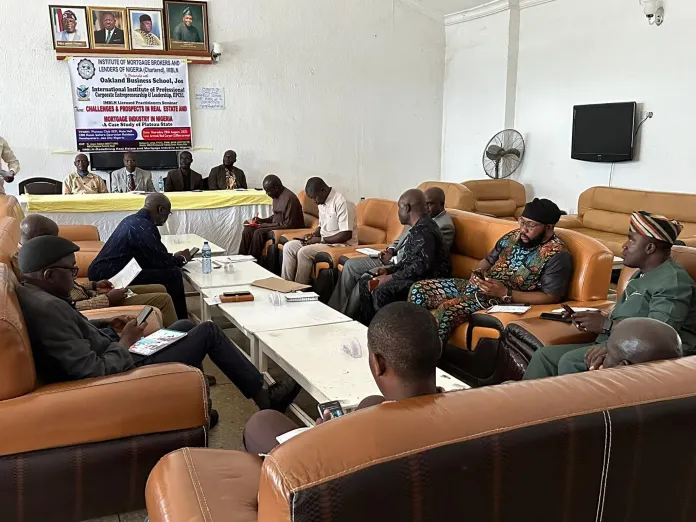The Institute of Mortgage Brokers and Lenders of Nigeria (Chartered) (IMBLN) has held its maiden Practitioners Seminar in Jos, Plateau State, setting the stage for new standards and reforms in Nigeria’s real estate and mortgage industry.
The seminar, hosted at Plateau Club 1921, was organized in partnership with Oakland Business School, Jos—IMBLN’s professional training centre—and the International Institute of Professional Corporate Entrepreneurship & Leadership (IIPCEL). With the theme “Challenges and Prospects in the Real Estate and Mortgage Industry in Nigeria – A Case Study of Plateau State,” the forum brought together industry experts, licensed practitioners, and policymakers.
Delivering a welcome address on behalf of the IMBLN Registrar-General, Dr. Jasper Adeleye, Mr. Godwin E. Urhie, Executive Chairman/CEO of Oakland Business School, described the seminar as a milestone in professionalizing the industry.
“The housing deficit in Nigeria, estimated at 28 million units and still growing, cannot be solved without innovative approaches. IMBLN is ready to work with government agencies to ensure transparency, eliminate quackery, and promote professionalism in the industry,” Urhie said.
He further noted that the institute’s licensing and training framework will help curb fraud, money laundering, and terrorism financing, while creating a credible environment for housing finance.

Key Presentations
Sunday Bulus Ndaka, in a paper titled “Land and Property Registration as a Catalyst for Mortgage Financing in Jos-Bukuru Metropolis,” identified difficulties in accessing land documentation and the burden of high equity contributions as barriers to affordable housing.
“Many Nigerians hold Certificates of Occupancy but still cannot access mortgage facilities due to stringent requirements such as high equity contributions. This continues to worsen the housing deficit and push rents higher,” Ndaka explained.
Ishaya Adams Dung, in his presentation on “Mortgage Challenges and Prospects: A Case Study of Plateau State,” explained that mortgage opportunities are not exclusive to civil servants but available to all qualified Nigerians. He, however, highlighted low awareness, bureaucratic delays, and slow legal processes as key factors discouraging potential homeowners.

Stakeholder Participation
The seminar was attended by representatives of the Plateau State Government, including a delegate for Arc. Sylvanus Dongtoe, Commissioner for Housing and Urban Development, and Saje Joseph Adeh, who represented the Commissioner for Education, Dr. (Mrs.) Kachollom Pyam Gang.
The event concluded with the presentation of training certificates to licensed practitioners. IMBLN also announced that the second batch of practitioners will begin lectures in September 2025, to be followed by a formal induction ceremony and the award of practice licences and seals.
Moving Forward
IMBLN reaffirmed its commitment to raising a new generation of ethical mortgage professionals and supporting Nigeria’s quest for affordable housing. The institute emphasized that its core values—professionalism, integrity, customer focus, transparency, and accountability—will remain central to its operations as it expands across the country.

